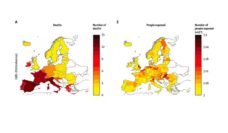My friends are surprised when I tell them that climate change and mental health are related. But it’s true. Heat waves are related to increased risk of suicide, hurricanes are linked to depression, and flooding can cause post-traumatic stress. As the world heats up, we can expect to see hotter average summer temperatures and more extreme weather events. And these changes are going to have an impact on people’s mental health. A recent study by Nick Obradovich and his colleagues at the MIT Media Lab was the first of its kind to quantify how climate change influences people’s mental health on a large-scale.
Obradovich and his team paired health survey data from over 2 million US residents collected by the CDC’s Behavioral Risk Factor Surveillance System with meteorological data from 2002-2012. The CDC mental health survey asked respondents to report whether they experienced any stress, depression, and/or emotional distress in the past 30 days. Changes in an area’s average mental health were then compared to different climate events.
Climate events were categorized as: short-term weather exposures (such as higher than average monthly temperatures or rain), long-term warming temperatures, and tropical cyclones.
The team found that, over longer periods, increasing average temperatures corresponded with increasing mental stress.
Hot weather and heavy rain increased depression, anxiety, and emotional distress. Areas which experienced average temperatures above 30°C (86°F) in a month, or more than 25 days of rain, had significantly more people reporting poor mental health than in cooler or drier areas. An additional 2 million people are expected to experience worsened mental health should average monthly temperatures shift from warm to hot weather (25°C to 30°) across the United States. Low-income populations, less able to cope with the environmental impacts of extreme weather, experienced worsened mental health from short-term hot temperatures and heavy rain.
The team found that, over longer periods, increasing average temperatures corresponded with increasing mental stress. More specifically, a 1°C increase in average summer high temperatures caused a two percent increase in the number of people who reported experiencing poor mental health.
Hurricane Katrina, which started as a tropical cyclone, had the greatest impact of recent weather events on wellbeing. The number of people who reported poor mental health in response to the Hurricane increased by four percentage points in the region affected.
According to Obradovich, exposure to climate stressors will continue to harm mental health. “Climate change has a day-to-day impact on our lives,” he explained. “It’s not just huge floods and hurricanes, though those obviously matter, too. The reality is climate change is so substantial that we’re not going to adapt perfectly. We need to improve quality and access to mental health care while also reducing our impact through mitigation techniques to slow down climate change.”
Feature image: spinster cardigan, sweltering, used under CC BY 2.0













